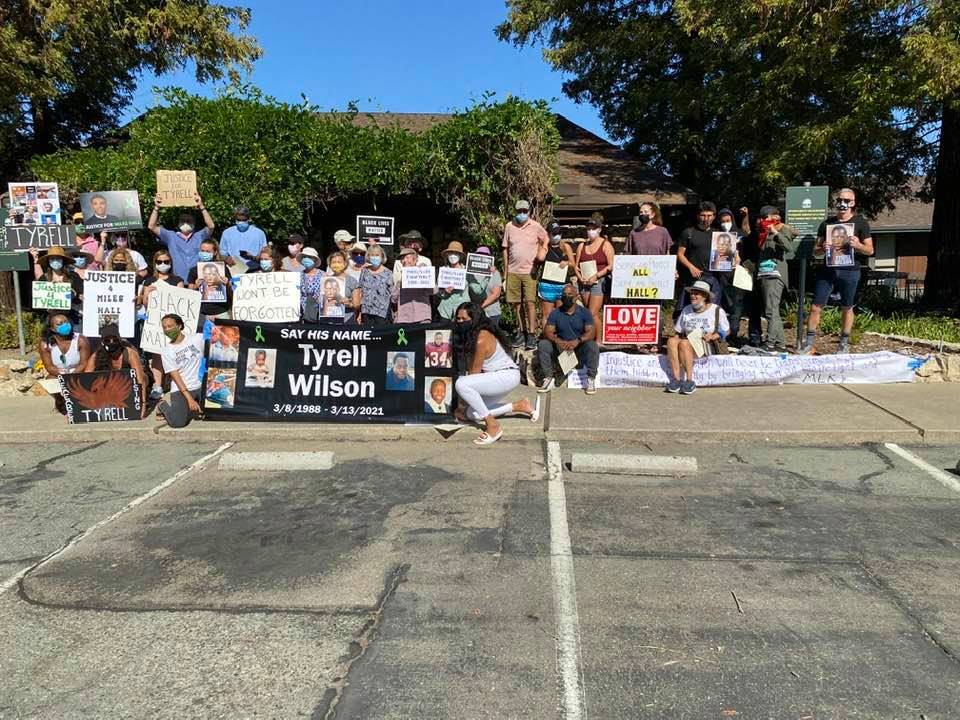The hard-plastic seats in the Brentwood bus shelter refused to stay under my butt, twirling and slipping under me no matter which way I would sort of sit/lie and try not to be cold.
This was just one in an endless series of freezing mornings me and mama spent trying to get warm while sleeping outside. These years of lonely homelessness crouched in bus shelters, doorways, and park benches across the Bay Area, flooded back to me when I heard about the shooting death of Tyrell Wilson, killed by police for being Black and houseless in Danville.

“Tyrell was a peaceful man, he was always so careful and I never felt threatened near him.”
This poverty skola had the blessing of speaking with life-long resident Veronica Benjamin, on Po Peoples Radio. She is one of the founders of Conscious Contra Costa County, which organized a powerful and prayerful multi-racial action for Tyrell, six months after his killing by sheriff deputy Andrew Hall in March, to bring attention to his life and the life of 33-year-old Laudemer Arboleda in 2018, also killed by Hall, who is now on trial for manslaughter.
The Arboleda family’s attorney, John Burris said about the charges filed against Hall: “Our view was if they had been prosecuted earlier our second client would not be dead.”
“We held this event today because we are still waiting for justice for Tyrell,” Veronica said at the rally.
It took the death of Tyrell to force the county to act. In April, the Contra Costa County District Attorney’s Office filed charges against Hall for the death of Arboleda, but there are still no charges filed specifically against Hall for Tyrell’s death.
In both killings, Hall was the shooter, but the town, which is more than 80 percent white, was the shot-caller. In Arboleda’s case, a resident called claiming that he was “acting funny,” code for Brown man driving in an overwhelmingly white suburb. And in Tyrell’s case, calls were made that “someone” was throwing rocks into the freeway.
Umm, someone who never causes any problems and works very hard to humbly exist without being seen, is going to throw rocks onto the freeway? One of the many reasons we poor and houseless peoples never engage with cops at POOR Magazine and put this book out and teach workshops of the same name.
“When I was on my way to my first date, I was pulled over and accused of being under the influence.”
At the action for Tyrell (re-ported and sup-ported on by Youth & family Poverty Skolaz media at PNN- ) there were many speakers, including artist Ras Ceylon, many conscious wite peoples and a warrior advocate from the National Alliance of Mental Mental (NAMI) presenting new bills to protect folks struggling with mental illness and over-policing.
But several people spoke to the extreme racism of the town, including a well-dressed pastor in his 40s who described his night of torture at the hands of those armed agents of the state.
This brought me back to the only experience my mama and me had with Danville. We would carefully and slowly drive into that place to sell our art in their bourgie street fairs, because word on the street was, if you sold art there you could make “bank” (a lot of money).
Every single time we would cross the Danvile city line, a cop would pull us over. We went three times, really needing the money that place would bring in, until the third time when they accused my mama of color of being under the influence, even though she hadn’t had a drink that that day or any other day, and she and I decided it was way too dangerous, even for the much-needed blood-stained bucks we could bring in.
“All the bus drivers I spoke to were shocked, they all said Tyrell was peaceful, polite, never caused any problems,” Veronica said. As Veronica spoke on Tyrell’s humble and careful moves, my mind wandered back to Brentwood again and one of this poverty skolaz’ most important teachers, Mr. Charles L.
Sometimes when our car-homes broke down or were towed (read: stolen) for expired registration, or Driving While Poor violations, which happened often throughout the years of me and mama’s houselessness, we would hop a bus to escape the endless policing and neighborhood-watch hating we got in Berkeley, Oakland and San Francisco, when we would try to find somewhere outside to sleep.
One of those times we had landed in Brentwood, one of one of hundreds of weird white suburbs splattered all over California. The struggle in these places was an unseen and terrifying one of “not looking dangerous.”
People who lived there were told and sold the lie of peacefulness, “good schools” and “safety.”
It was in Brentwood that we met Charles L, an elder Black man who ever-so-carefully camped in the bus shelter next to us, a block down the over-wide road.
Mr. Charles would spend literally hours folding, vetting, creatively designing and organizing his tiny pile of belongings just make sure he never took more than the little square under his plastic seat. As a severely organizationally challenged person, I was fascinated with his skills. Like many of us folks who struggle with extreme poverty, incarceration, homelessness, racism and abuse in this stolen land, Mr. Charles was an unrecognized designer.
“Living my life in this town has been hard for many reasons,” Veronica explained, “one of which is I was always worried for my father’s safety, who is literally one of the few men of color who live in this town.
“When I first got the message about Tyrell’s murder I was afraid it was my dad.”
Veronica paused. “We will not stop until we get justice for Tyrell.”





